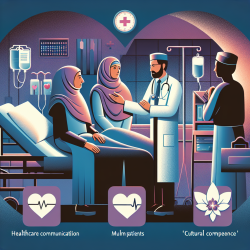Introduction
As the number of Muslim patients in the U.S. continues to rise, healthcare providers are increasingly encountering unique challenges related to cultural and religious diversity. The research article "Muslim patients in the U.S. confronting challenges regarding end-of-life and palliative care: the experiences and roles of hospital chaplains" sheds light on these challenges and offers valuable insights for practitioners seeking to improve their skills and provide more inclusive care.
Understanding the Challenges
The study highlights that misunderstandings between non-Muslim healthcare providers and Muslim patients often stem from a lack of knowledge about Islamic beliefs and practices. This gap can lead to tensions, especially in sensitive areas such as end-of-life care and pain management. For instance, Muslim patients may view suffering as redemptive and may prefer minimal pain relief to remain conscious for religious rituals at the end of life.
Additionally, societal Islamophobia can exacerbate these challenges, causing Muslim patients to fear discrimination and hesitate to disclose their religious identity. This fear can hinder open communication and trust between patients and healthcare providers.
The Role of Chaplains
Chaplains, both Muslim and non-Muslim, play a crucial role in bridging these gaps. They can mediate tensions, educate healthcare staff about Islamic beliefs, and provide support to Muslim patients and their families. The study emphasizes the importance of having Muslim chaplains who can offer culturally and religiously congruent care, thus enhancing trust and understanding.
Practical Implications for Practitioners
- Education and Training: Healthcare providers should seek to learn more about Islam and its implications for medical care. This includes understanding Islamic perspectives on suffering, end-of-life decisions, and family dynamics.
- Building Trust: Practitioners can build trust by showing respect for Islamic beliefs and practices, such as offering prayer mats or accommodating dietary restrictions.
- Collaboration with Chaplains: Engaging with chaplains, especially those familiar with Islamic traditions, can help in addressing the spiritual and emotional needs of Muslim patients.
- Community Engagement: In the absence of Muslim chaplains, hospitals can collaborate with local imams to provide religious support to Muslim patients.
Encouraging Further Research
While the study provides valuable insights, it also highlights the need for further research to explore the experiences of Muslim patients and the effectiveness of different interventions. Practitioners are encouraged to engage in research initiatives that aim to improve cultural competence and patient care outcomes.
To read the original research paper, please follow this link: Muslim patients in the U.S. confronting challenges regarding end-of-life and palliative care: the experiences and roles of hospital chaplains.










